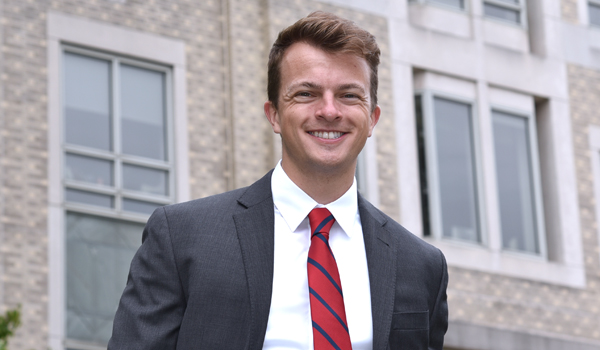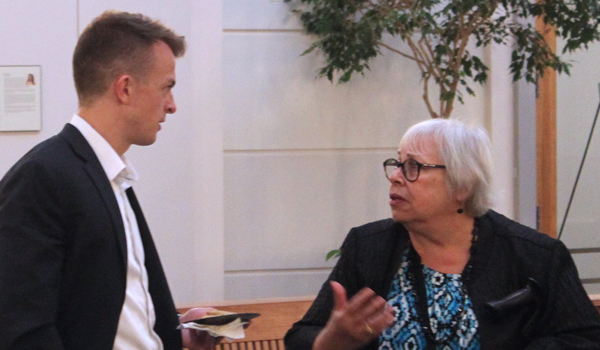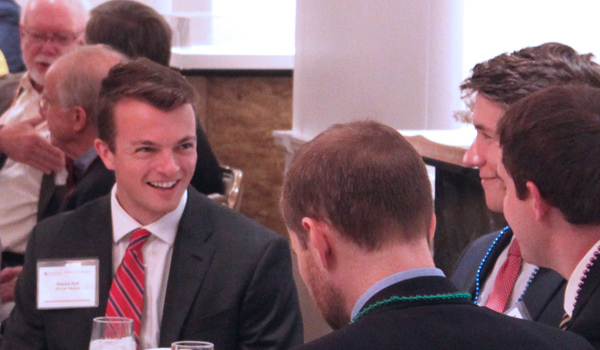 Catholic Law recognizes the importance of a supportive and connected community. It’s not just some vague concept, it’s ingrained into the culture of the school. As a student, there is no better way to learn how to navigate and succeed in law school than learning from someone who has been in your shoes, and Catholic Law students go out of their way to help support one another. For third-year law student Patrick Hall, this dynamic has been an important part of his law school experience and he leans into this mission every day through his various roles on campus. “Catholic Law does an excellent job of facilitating mentor-mentee relationships. There are formal mentors, but the informal relationships students forge together are plentiful and strong. That is one of the perks of having a tight-knit legal community.”
Catholic Law recognizes the importance of a supportive and connected community. It’s not just some vague concept, it’s ingrained into the culture of the school. As a student, there is no better way to learn how to navigate and succeed in law school than learning from someone who has been in your shoes, and Catholic Law students go out of their way to help support one another. For third-year law student Patrick Hall, this dynamic has been an important part of his law school experience and he leans into this mission every day through his various roles on campus. “Catholic Law does an excellent job of facilitating mentor-mentee relationships. There are formal mentors, but the informal relationships students forge together are plentiful and strong. That is one of the perks of having a tight-knit legal community.”
Hall, a native of the Pittsburgh, Pennsylvania area earned his Bachelor of Science degree from Pennsylvania State University. Hall knew he wanted to go to law school, but did not go straight into it from undergrad. Instead, Hall took a year between undergrad and law school to work at a law firm in his hometown. The experience reaffirmed his desire to go to law school. “I worked after receiving my undergraduate degree for one year as an accountant and billing clerk at a law firm in my hometown. There, I saw the behind-the-scenes work that takes place in a law firm and had the opportunity to observe successful attorneys in their element.” Not only did the experience bolster Hall’s desire to go to law school, but it also provided him with a glimpse into the importance of each member of the community within a law firm. Hall shared, “I learned how important the legal staff and office administrators (for instance, the paralegals, secretaries, accountants, technical support, and marketing team) are to the operation of the firm. I am incredibly grateful for my experience at this firm because it affirmed my interest in attending law school.”
 When it came time for Hall to choose which law school to attend, Catholic Law stood out to him. “Catholic Law’s small law student community and location in a superabundant legal market in our nation’s capital form a rare combination that most other schools can only hope to boast about. Those two factors are what drove me her the most.” Hall continued, “Since starting law school in 2018, I have been happy to contribute to this community and form integral relationships with fellow students, professors, and alumni. The professors here really care about the success of their students, and they strive to get the best out of us. And it should go without saying that Washington, D.C. provides internships and networking opportunities unlike anywhere else.”
When it came time for Hall to choose which law school to attend, Catholic Law stood out to him. “Catholic Law’s small law student community and location in a superabundant legal market in our nation’s capital form a rare combination that most other schools can only hope to boast about. Those two factors are what drove me her the most.” Hall continued, “Since starting law school in 2018, I have been happy to contribute to this community and form integral relationships with fellow students, professors, and alumni. The professors here really care about the success of their students, and they strive to get the best out of us. And it should go without saying that Washington, D.C. provides internships and networking opportunities unlike anywhere else.”
The collegial campus community combined with proximity to countless legal opportunities has allowed Hall to thrive on- and off-campus. Now entering his third and final year at the Law School, Hall reflected on the impact of taking advantage of such opportunities. As a member of several organizations on campus, he contributes to the robust campus life. “I serve as the Executive Editor of Catholic University Law Review, Vice President of Financial Affairs for the Student Bar Association, and an Executive Board Member of the Securities Law Student Association. I also serve as a Dean’s Academic Fellow and Cardinal Mentor to first- and second-year law students. I take great pride in these positions, and I view my contributions collectively as a way to make a positive mark on the law school community.”
 Hall has also taken advantage of several internship and externship opportunities. These experiences have allowed him to serve those in the neighboring D.C. communities as well as receive practical training for life post-graduation. “I interned for a judge on the Superior Court of D.C. and at a large law firm during my summers while in law school. Additionally, I externed at the U.S. Securities and Exchange Commission throughout both semesters of my second year. I currently participate in the Veterans Advocacy and Estate Planning Clinic through the Columbus Community Legal Services, and I volunteered pro bono with the Volunteer Income Tax Assistance (VITA) program during my first year. Each of these opportunities provided an experiential, practical approach to learning the law, and I highly recommend supplementing academic courses with externships and other similar opportunities to my fellow students.” He explained further, “One of the goals associated with attending law school is to enter the legal workforce as prepared as possible, and externships, clinics, and pro bono work can facilitate that process.”
Hall has also taken advantage of several internship and externship opportunities. These experiences have allowed him to serve those in the neighboring D.C. communities as well as receive practical training for life post-graduation. “I interned for a judge on the Superior Court of D.C. and at a large law firm during my summers while in law school. Additionally, I externed at the U.S. Securities and Exchange Commission throughout both semesters of my second year. I currently participate in the Veterans Advocacy and Estate Planning Clinic through the Columbus Community Legal Services, and I volunteered pro bono with the Volunteer Income Tax Assistance (VITA) program during my first year. Each of these opportunities provided an experiential, practical approach to learning the law, and I highly recommend supplementing academic courses with externships and other similar opportunities to my fellow students.” He explained further, “One of the goals associated with attending law school is to enter the legal workforce as prepared as possible, and externships, clinics, and pro bono work can facilitate that process.”
In March, Catholic Law, like colleges and universities across the country, responded to the global pandemic by pivoting to a virtual learning model and the term “community” started to take different forms. Events, meetings, classes—all went online. As the fall semester began, it was evident that precautions were still vitally necessary to the health and safety of the community. While many first-year students were welcomed onto campus for classes, the upper-division students by-and-large were not. Hall noted, “I have learned that I took for granted my time studying at the school or working in the office, and I cannot wait to get back! There are some days when it is nice to stay home and not have to commute, but overall, I enjoy working and interacting with other people.”
Though things look a little different this year, Hall is appreciative of his law school experience and the relationships he has built through his time at Catholic Law. “I had a couple of excellent student mentors when I was new to law school, and I am so thankful for those relationships. Now, in several of my roles, I try to serve as a mentor to younger students and pay forward those acts of kindness that upper-level law students showed me when I was new. My experience with alumni has been the same: Catholic Law students and graduates look out for one another, and I am a proud member of this community.”
